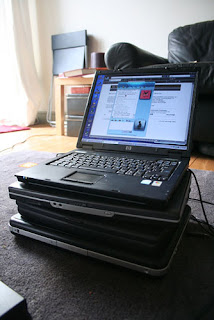In a fast-moving world such as technology, computers become outdated quickly and the need to dispose of them properly becomes more and more important. Figures from United Nations show that around 50 million metric tonnes of electrical waste is accumulated around the world every year.
Regardless of how much landfill space they can take up, computers contain hazardous chemicals such as lead oxide, mercury, nickel, zinc and cadmium. If these toxins and other heavy metals end up in landfill rather than a recycling centre, they can cause soil and water pollution and endanger wildlife. For example, cadmium can damage organisms in the soil which then affects the breakdown of organic matter. The substance has also been known to kill fish, which reduces their numbers.
At the same time as being a reason to produce laptops using less hazardous materials, it is a big reason to make sure your laptop is disposed of correctly when no longer needed.
If the laptop is nearing the end of its life, be careful when donating to charity – it can prove a headache if they are left with, and have to dispose of, a non-functioning laptop.
At a recycling facility, the computer will be taken apart and its metals and plastics recycled where possible. Harmful materials will then be disposed of in the correct manner.
Regardless of how much landfill space they can take up, computers contain hazardous chemicals such as lead oxide, mercury, nickel, zinc and cadmium. If these toxins and other heavy metals end up in landfill rather than a recycling centre, they can cause soil and water pollution and endanger wildlife. For example, cadmium can damage organisms in the soil which then affects the breakdown of organic matter. The substance has also been known to kill fish, which reduces their numbers.
At the same time as being a reason to produce laptops using less hazardous materials, it is a big reason to make sure your laptop is disposed of correctly when no longer needed.
What is computer recycling?
Laptop recycling is the process of either refurbishing a unwanted device or harvesting it for parts that can be of use elsewhere. Unwanted items can either be sent to a refurbishing business, a specialist recycling service or, if still in good working order, donated to schools and clubs in your area. Recycling can be as simple as donating to friends and family.If the laptop is nearing the end of its life, be careful when donating to charity – it can prove a headache if they are left with, and have to dispose of, a non-functioning laptop.
At a recycling facility, the computer will be taken apart and its metals and plastics recycled where possible. Harmful materials will then be disposed of in the correct manner.
Recommended for you: Why Computers Recycling In Areas Should Be Done?
Many refurbishing companies give their revamped computers to school systems, correctional facilities and charity programs which allows the less fortunate to learn how to use them to prepare for their future.
Often, the company you buy your laptop from will offer a free return service – ask before you buy. If this is not an option, your local council may run a scheme. For more details, go to the Environment Agency Website or contact your local authority. Whichever method you choose, make sure all of your personal data has been wiped from the machine before you give it away.
Image Credit: Flickr.
What are the benefits of recycling?
As mentioned earlier, proper disposal of unwanted electrical items avoids them unnecessarily clogging up landfill space and protects the environment. If you are donating you can also allow other people to buy laptops at an affordable price.Many refurbishing companies give their revamped computers to school systems, correctional facilities and charity programs which allows the less fortunate to learn how to use them to prepare for their future.
What’s in my laptop?
There are some very valuable things that go into making a laptop; engineered plastics, steel, copper, aluminium and precious metals like gold, platinum and palladium. The recycling process attempts to recover these for use elsewhere once the device has reached the end of its life. In 2009, only an estimated 38 per cent of computers thrown away were recycled properly. The remainder end up in landfills where these materials are no longer available for reuse in the manufacturing of new products.Often, the company you buy your laptop from will offer a free return service – ask before you buy. If this is not an option, your local council may run a scheme. For more details, go to the Environment Agency Website or contact your local authority. Whichever method you choose, make sure all of your personal data has been wiped from the machine before you give it away.
Image Credit: Flickr.
Author Bio:
Guest post contributed by Simon Jones. A technology geek who loves to give hints & tips when it comes to technology, not just using it, but also how to dispose of it correctly when the time comes, to help the environment. Simon also has a large knowledge of Business Software - BT Business Direct and helps people in business find the right software for their needs.









Post a Comment